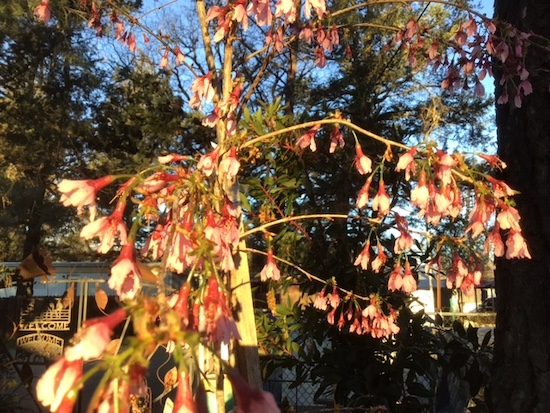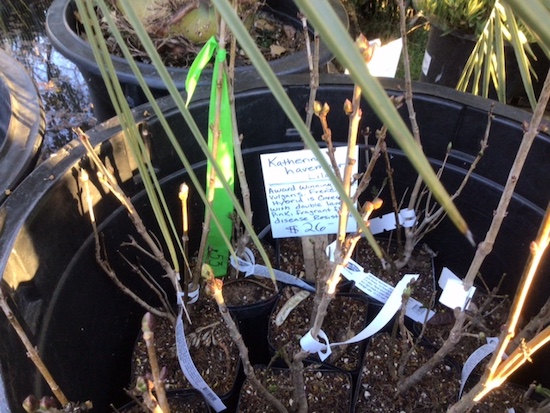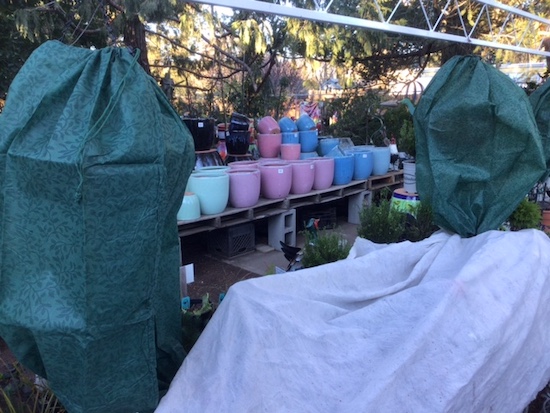
SPRING HOURS START MARCH 1ST
OPEN 9-5, RAIN DAYS 10-4
What a difference a week can make in the Coastal Range of No. California. We went from sweating, literally, to getting roses potted up when the second-order came in and stressing about how early things were popping to cold and hard freezing days. We forgot to turn the heater on in the salesroom last night, and it was 35 in there this morning. Today’s low this morning at the nursery was 18. Our first order of plugs for our custom baskets and containers arrived just in time for the cold snap. So far, so good with double frost cloth in the greenhouse. Of course, our first of three orders is mostly petunias and calibrochoas that can take some frost. We do have a few casualties like the Bower Vine and Helichrysum we just got in and forgot to protect. Looks like my open peach flowers took the hit, but I have hope for the flower buds that were not open yet. Now you know why we do not have tomatoes yet.
We have not had this cold of nights in several years now. That always leads me to worry about fruit tree chill hours. Have we received enough for the varieties we sell? Chill hours are temperatures between 32 and 45 degrees. Different varieties of fruit have different required hours to successfully form good fruit. Gala and Fuji are less than 500, Gravenstein 700, and Honeycrisp needs at least 800. Elberta Peach is rated at 600, but the cold and frost-hardy Halehaven needs 900. Bartlett pears 500-600, but Red D’Anjou is 900. Cherries run from 500 to 800. A lot of the blueberries need 600-800. Some need 1000. Well, I can report from the Lake County Wine Growers site that Middletown South has over 1200 and Kelseyville over 1000 chill hours so far, so I think we are good.

Lilacs on special this month
There has been a lot of talk about bees. Bees are a good indicator of environmental quality and are crucial to our landscapes and food supply. Did you know there are over 1600 species of native bees in California? Neither did I until I did some info gathering on one of them, the Mason bee. They get the name mason because they use mud to create walls between their egg chambers. Most nest in pre-existing pencil size cavities in wood or tubes humans provide. First, they collect pollen to place in the tube, then lay their egg and section it off with mud, repeating till the tube is filled, usually 5-6 eggs. A female lays 15-20 eggs in her lifetime. Mason bees are solitary bees and work alone. The female mates, lays her eggs, and dies about 10 weeks later. They do not make honey but are excellent pollinators. They get to work in cooler temps than honeybees and have a 95% pollination rate compared to 5% for honey bees. I read it’s because they have no finesse to gathering pollen and just get covered with it, spreading it everywhere. They also make their nests closer to their pollen food sources than honeybees. We have Mason bees for sale right now at the nursery. They come in tubes of 6 eggs for $17.99. You can make your own mason bee house. It is a great project to do with children. We have a few houses and bee planter boxes for sale, too.
We are experiencing some supply issues, and with the conflict in Ukraine, it is only going to get worse. If you follow us on Facebook or Instagram, you know our 2022 seed order is delayed. If we had only known we would have asked for them to be delivered at the end of last year. Every day UPS or FEDEX shows up, hoping it is our seed order, but nothing so far. So really, it should be any day. The bulb order is delayed too. Most of it ships from Holland, and their freight/ship was delayed twice. Still not able to get VF-11.

New pottery
One thing we are not short on right now is pottery. We have a good selection of terracotta and glazed pots. We just received 2 pallets of two new styles for us, and another of our pre-order pallets is due next week. Our best selection of roses is now. We had to pot most up, but we still have some bare root too. We will have potted Austin Roses coming in at a later date. Another shortage are the variety signs for the roses from Star. Of course, we found this out right after we threw away last year’s signs because we thought we were getting new ones. We have sold out of some of the popular varieties of fruit but still plenty to choose from. One thing we still have in bare-root is a few CA Redbud, starting to bloom along our roads now. As March progresses, we will be continuing to ‘can’ the trees and roses, so if you are still hoping for bare-root prices, do not delay.

It is still early spring, but we have been getting new things in. Fresh cutting grown petunias, calibrochoas, nemesias, herbs, and bacopa are some. The ranunculus in 4-inch pots from Gaddis has been outstanding. Spring Anemones are starting to bloom. Fresh pansies and violas are showing color. The carnations/dianthus look good too. It is prime euphorbia time, although the selection is light right now. We have #1 Ceanothus, the CA. Wild Lilac will be blooming in the wild soon. Another great native in stock now is CA. Fuchsia. They bloom mid-summer into fall. (Spoiler alert: this is the common name and is not in the Fuchsia genus. Totally different.) Hummingbirds love it.
A word about pricing. As much as possible we are trying to keep from raising our prices on plants. On some items, this will not be possible. Some are the things that we should of raised last year but chose not to. We will have to do it this year. Quart perennials from Blooms are going up to $6.99. The 4 inch smaller pots of perennials will remain at 5.99. Individual vegetable starts are going up to $3.49. The prices for our 6 packs of vegetables will remain the same. The 6 packs of annuals like petunias will also stay at $5.99. We will continue to sell the 4-inch specialty petunias at the same price as last year, but we will have to raise the price on the quart sizes. I have tried to keep utility shrubs like oleander, boxwood, and photinia at a lower mark-up. This year we just had to bite the bullet and price the #1 boxwood at $11.99. Potted fruit trees are also going up.

New head planters
We are back open 9-5 on March 1st, 10-4 on rain days. That gives us a little time to transition from 6 to 8 hours and the time change on Mar 13th. It is still cold in the mornings here at 9, but people have been coming before we open and arriving after we close with some frequency already.
March Specials
2 cf Potting Soil Buy 3, 4th Free
20% Off
- All Syringa vulgaris, Common Lilac, and cultivars
(Not Persian Lilac) - Potted Fruit and Nut trees
- Potted Roses
- 2 gal. Hellebores while supply lasts

Frost cover on the hanging baskets.